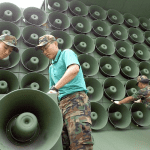The foreign ministries of China and India agreed in a joint statement on Friday that their troops must quickly disengage from a months-long standoff along their disputed Himalayan border.
Chinese State Councilor and Foreign Minister Wang Yi, and Indian Foreign Minister Subrahmanyam Jaishankar met on the sidelines of a Shanghai Cooperation Organisation (SCO) foreign ministers’ meeting in Moscow to try and end the dispute, the most serious in decades at the undemarcated border.
Separately, China’s foreign ministry said it would maintain communications with India through diplomatic and military channels and commit to “restoring peace and tranquillity” in the disputed border area.
Elaborating on the Moscow meeting, China said Wang had told Jaishankar that the “imperative is to immediately stop provocations such as firing and other dangerous actions that violate the commitments made by the two sides”.
All personnel and equipment that have trespassed at the border must be moved and frontier troops on both sides “must quickly disengage” in order to de-escalate the situation, Wang added.
The deal accordding to Sumit Ganguly, a professor of political science at Indiana University, is significant but on the other hand he called for caution adding that all should adopt a wait and see attitude and observe what transpires in the next few weeks and months.
Speaking on the five-point agreement between the two countries, Ganguly said they would probably involve withdrawing troops from eyeball-to-eyeball contact with one another.
The Chinese ministry had called on India to stop the “atmosphere of confrontation” and start to “cooperate and build mutual trust rather than suspicion,” Yu said.
The Global Times newspaper, however, was sceptical, saying that the implementation of the agreement depended on India being able to keep up its end of the bargain.
In an editorial published ahead of the two ministers’ meeting, the paper accused India of holding a grudge over the 1962 war, and described the country as in “an unprecedented state of puffing”.
Wang and Jaishanka’s meeting took place after a border clash earlier this week when each accused the other of firing in the air during a confrontation on their border in the western Himalayas, a violation of long-held protocols on the use of firearms on the sensitive frontier.
The Chinese ministry said the two countries reached the five-point consensus on reducing tension in the area including the need to abide by existing agreements to ensure peace.
Meanwhile, Russia’s Foreign Ministry on Friday said it hoped China and India would find a solution as soon as possible to de-escalate renewed tensions, the Interfax news agency said.
The breakthrough comes a week after India’s Defence Minister Rajnath Singh met his Chinese counterpart Wei Fenghe on the sidelines of another SCO gathering, also in Moscow.
In that meeting, Wei had reportedly told Singh that Beijing would not cede an “inch of its territory”.
Both sides have intermittently claimed troop withdrawal and disengagement but reports of skirmishes continue with heavy military deployment by the nuclear-armed neighbours.
India and China have differing perceptions of what constitutes the Line of Actual Control – the de facto border – that runs through the disputed territory on their Himalayan border.
Tensions in the region have been high since May when India alleged that Chinese troops took control of its territory in the Ladakh region that has been patrolled by Indian soldiers for decades.














